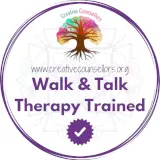
FAQs
What exactly is a Clinical Psychologist?
For someone to call themself a Clinical Psychologist they must have completed a very high level of training known as a Doctorate in Clinical Psychology. This is a three year course which someone typically does after completing a first degree in Psychology and then acquiring 2-3 years of working experience. A Clinical Psychologist will also be registered with the Health Care Professional’s Council (HCPC) which makes sure we are all working to an expected standard and keeping the public safe.
A Clinical Psychologist will use their professional training, experience, and the information we get from research studies on what works best, to support you. We can help you understand why you might be having the difficulties you are, and work with you to make changes.
Is there a difference between psychological therapy and counselling?
A lot of the time these two words are used interchangeably to refer to the same thing – talking therapies, there are however some subtle differences. In counselling, a person is typically given the opportunity to talk through their feelings and difficulties with someone who is trained to listen without being judgemental. Some people find that this is then enough for them to be able to process things and feel better.
Psychological therapy aims to get a thorough understanding of your difficulties and then use established techniques to help you make some changes. In this respect I would say that psychological therapy tends to be more of an active process. You’ll be encouraged to try new things and practice these between sessions.
What types of therapy do you offer?
The main types of therapy I work with are Cognitive Behavioural Therapy (CBT), Graded Exposure, Acceptance and Commitment Therapy (ACT) and Compassion Focussed Therapy (CFT). Depending on your needs and preferences we may use just one of these, or a combination of the different types. This is known as an ‘integrative’ approach as is one of the things Clinical Psychologists are trained to do. I’ll be writing more on the different types of therapy in a future blog post!
Can you read my mind?! Are you 'analysing' me?!
I definitely cannot read your mind! I’m not able to tell what thoughts are going through your head unless you choose to share them with me. Rest assured if you’re thinking that my glasses don’t suit my face then I’ll be blissfully unaware!
As for analysing, I think that depends on what we mean by that word. I certainly won’t be making all sorts of wild judgements and inferences about you that are unrelated to what we’re talking about. We do however all make judgements about people based on their appearance and body language, such as “They look like a friendly person”. In therapy, I am paying attention to the ways people talk about things and their body language, but I will be sharing my observations and checking things out with you along the way. I might say something like “it looks like thinking about that makes you feel really happy and alive, you sat up in your seat” and ask you whether I’ve got that right or not.
I don't feel comfortable sitting opposite someone and talking, can you still help?
Absolutely! I totally understand that for lots of people sitting in a room and talking doesn’t feel very comfortable! I love being outdoors and am very happy to offer sessions in green spaces, we can talk and walk at the same time.
For those who do want to meet face to face in a more traditional space, I have a room I use in the centre of Worcester. I also offer online appointments via video call.
Why is therapy so expensive?
This is a really good question to think about and one which I would be wondering myself if I wasn’t a Psychologist. When you pay for a session with a Psychologist, you’re paying for more than the hour that we spend together. A Psychologist will spend a lot of time thinking about you in between sessions and coming up with the best ways to try and support you. By the time someone becomes a Clinical Psychologist they will have been trained to a high level and amassed a lot of experience, so you’re paying for this too. There are also a lot of things a Psychologist will be having to pay for to run their business such as insurances, administrative support and office space.
You may have seen other therapists, counsellors and psychologists charging lesser fees. It’s really important that each person charges what is right for them. For me, the fee I charge means that I can support my family without needing to see so many people each week that I end up burnt out, with no time to keep my skills relevant and no space in my head to remember who I’m seeing and what we’re working on. It allows me to keep the number of people I’m working with at a level, I can be confident that everyone I work with is getting the very best of me and allows me to keep well too.
How many sessions will I need?


